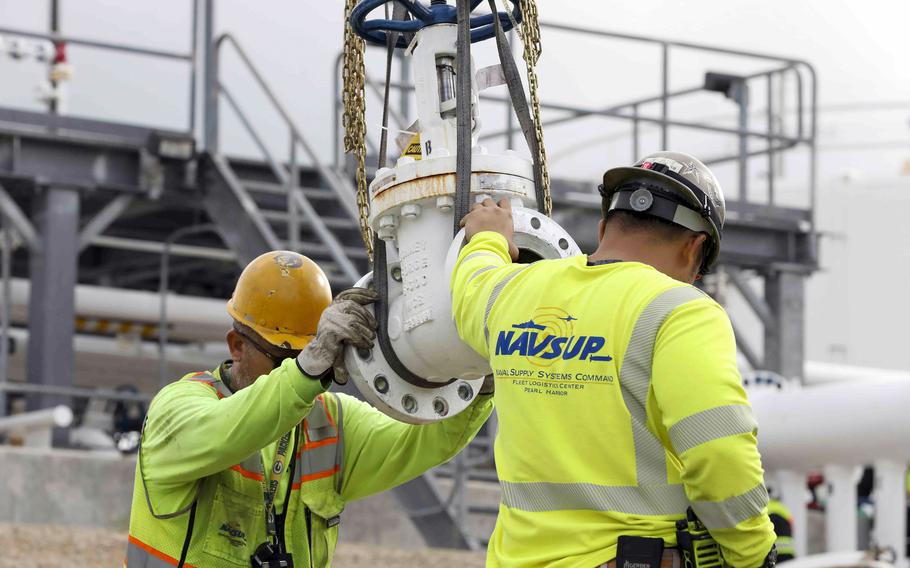
Contractors working for Navy Closure Task Force-Red Hill on March 27, 2024, move a disassembled section of diesel fuel pipe outside of an entrance to the Red Hill Bulk Fuel Storage Facility in Hawaii, which has been ordered permanently closed. (Glenn Slaughter/U.S. Navy)
HONOLULU — The former U.S. Pacific Fleet surgeon testified Tuesday in Hawaii federal court as U.S. attorneys began their defense in a civil suit by military families alleging physical and mental illnesses from consuming tap water contaminated by Navy jet fuel.
Dr. Michael McGinnis testified he had not seen data to indicate the fouled tap water was not safe to consume on Nov. 29, 2021, not long after the Navy started receiving complaints.
However, McGinnis’ observation, according to the judge hearing the case, is beside the point. The trial is limited to what caused a catalog of maladies that the plaintiffs claim arose from the contaminated water.
McGinnis, the active-duty fleet surgeon and senior medical adviser to the fleet commander from January 2020 to July 2022, was cross-examined by plaintiffs’ attorney Kristina Baehr based on his previously submitted, sworn declaration in the case.
Baehr focused on what role McGinnis had played in the Navy’s communication to residents regarding the safety of using tap water during roughly the first week after residents began complaining.
Some plaintiffs testified last week that the Navy gave mixed messages about the water at the time.
Baehr asked McGinnis for his assessment of a Navy document from Nov. 29, 2021, that stated “ … there is no immediate indication that the water is not safe.”
McGinnis, on the stand, agreed with that statement.
“I am not aware of any positive results on Nov. 29 that the water was not safe,” he responded.
U.S. District Court Judge Leslie Kobayashi, however, grew impatient with Baehr’s line of questioning, saying it served no purpose.
“What’s the point?” Kobayashi said, advising Baehr that the only matters to be resolved during trial are the causation of illnesses and conditions of the plaintiffs and the amount of monetary damages to be awarded for those injuries.
Kobayashi is hearing the case without a jury.
In his declaration, McGinnis described a prompt and organized Navy response beginning in late November 2021 when residents in military housing communities on and near Joint Base Pearl Harbor-Hickam began complaining of foul-smelling water that exhibited an oily sheen when poured in cups and pots.
The government has acknowledged responsibility for the fuel spill and tainted water, but the defense is seeking to show that the contamination’s duration and extent was too minimal to have caused widespread and serious injury.
The trial is on behalf of 17 bellwether plaintiffs named in Feindt vs. United States.
More than 7,500 additional plaintiffs have joined several other lawsuits also seeking compensation. Prospects for those plaintiffs will be determined in part by the outcome of the ongoing Feindt trial that began April 29.
The Navy traced the contamination to a jet fuel spill at the World War II-era Red Hill Bulk Fuel Storage Facility that happened over the course of Nov. 20-21, 2021.
Some of that fuel quickly seeped through the porous stone above the aquifer and ended up in the Navy’s Red Hill well, one of three wells the service used to feed its water distribution system.
The plaintiffs have claimed a host of physical and emotional problems arose from the contamination, from rashes, nausea and dizziness to seizures, brain fog and tremors.
McGinnis stated in his declaration that he first became aware of concerns about the water during a staff meeting on Nov. 29, 2021. That was several days after the Navy began fielding complaints about the water over the long Thanksgiving Day holiday.
“I quickly stood up a working group — the Joint Health Services Working Group (JHSWG) — that brought together all the medical leaders on island,” he stated in his declaration.
He also attended a series of Navy town-hall meetings in the wake of the complaints during which he provided health-related information, he said in the declaration.
Testimony is scheduled to continue Wednesday, with trial expected to conclude Monday.